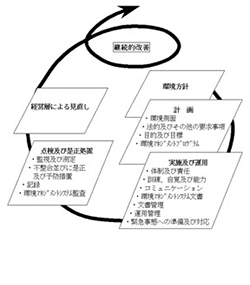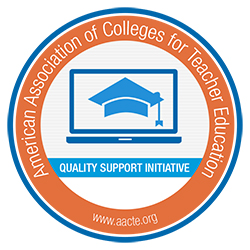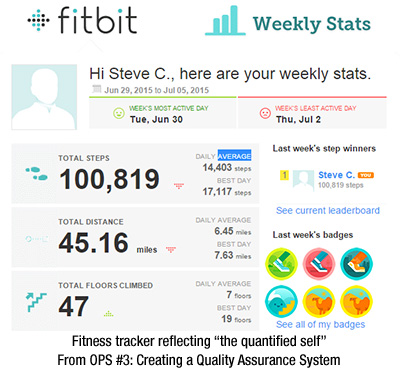26 Jan2016
By Darlene Hunter

Continuous Improvement Cycle — Ministry of the Environment, Tokyo
From OPS #2: Using Data for Improvement
One of the special features of AACTE’s Online Professional Seminars (OPSs) is their attention to assessment internationally. Looking to other countries for examples of assessment processes helps us to appreciate commonalities and, as this diagram accomplishes, reminds us of the power of graphics—even if we don’t understand the text.
As you will learn in the introductory OPS short courses, assessment systems are often depicted as a circle of connected steps. The accreditation world brought “close the loop” to our diagramming to illustrate the conclusion of an assessment cycle and launch of the next one. A spiraling curve communicates the most powerful aspect of assessment: continuous improvement.
AACTE’s Quality Support Initiative offers two free introductory courses, OPS #1: Building Quality Assessments and OPS #2: Using Data for Improvement. Like all of AACTE’s online seminars, these feature mobile-friendly content and asynchronous discussions that can be accessed anytime during their 4-week span. They have no prerequisites, can be taken out of sequence, and are open to everyone.
19 Jan2016
By Lillian Chenoweth

Real sign from the UK, highlighting the absence of Type O blood in the nation’s blood banks.
From OPS #3 Creating a Quality Assurance System
The “missing O” campaign in the United Kingdom embedded a crucial message in the community to bring attention to the dwindling supply of Type O blood in the nation’s blood banks. From graphics and encoded messaging like this city sign for Downing Street, citizens learned of a need in novel ways.
An entire environment can serve as the billboard for information that can drive change. That type of systemic thinking is behind AACTE’s Online Professional Seminar (OPS) #3: Creating a Quality Assurance System.
As Mark Lacelle-Peterson advises, “Every EPP has a quality assurance system, but it is not necessarily recognized. The work of committees, of data reviewers, of stakeholders at all levels contributes to what is essentially the quality assurance provision.”
12 Jan2016
By Lillian Chenoweth
Accreditation work involves considerable project management to track logistics and the activities of stakeholders. Resource management is a usual business practice of academic units, but the tools are not typically suitable for tracking projects with due dates and multiple actors. Tune in to AACTE’s upcoming Online Professional Seminars (OPSs) to learn about specialized software and methods for managing assessment cycles, quality assurance systems, and accreditation submissions.
In a session starting January 25, OPS #6: Leveraging Accreditation for Quality Improvement will cover topics such as ethical considerations, tools, checklists, site visits, mock visits, and walk-throughs. Or join us starting February 8 for OPS #5: Preparing for Accreditation, where we’ll cover teamwork, readiness, calendar planning, document control, best practices, and more.
05 Jan2016
By Mary Bold
Is it OK to take a shortcut with rubrics? Join a free online course starting February 1 to discuss the appropriate uses of “minirubrics” and other feedback mechanisms in AACTE’s Online Professional Seminar (OPS) #1: Building Quality Assessments.
Here’s a quick preview: A minirubric is a cross between a rating scale and a short rubric. With criteria barely described, a minirubric cannot be said to provide guidance—but it does provide feedback. And its typical visual form puts color to work for the learner. The rating labels may be identical to those in a full rubric. What’s new is the at-a-glance presentation.
22 Dec2015
By Darlene Hunter
How do you get ready for an accreditation site visit? How do you instill confidence that you have the right agenda, people, and resources? Learn how to set the stage for success with an online short course this winter.
In AACTE’s Online Professional Seminar (OPS) #6: Leveraging Accreditation for Quality Improvement, you’ll find pragmatic advice such as strategies for not just a mock visit, or dress rehearsal, but an earlier walk-through that builds in time for repair. Walking through the day you intend to share with site visitors should uncover gaps, logistical issues, and maybe even potholes. Hopefully you will also celebrate what you recognize as your strengths. The benefit of the early walk-through is to give your team time to transform all the elements into strengths.
14 Dec2015
By Sharon Edwards and Malinda Hoskins Lloyd
Although we may not have read it in a while or considered it with a lot of thought, we all have a conceptual framework for our programs. When we are faced with implementing new policies or considering other innovations, though, our conceptual framework is an essential guide that helps our programs undergo change while retaining their core identity.
At a session we attended last month at the Tennessee edTPA® Conference, faculty from the University of Tennessee, Knoxville (UTK), demonstrated how sticking to their conceptual framework allowed them to embrace a new assessment without having to “jump through hoops.” Jennifer Jordan and her UTK colleagues intentionally and continually referenced their conceptual framework as they discussed how their institution considered integrating edTPA while also following the mantra, “We’re not going to give up who we are!”
08 Dec2015
By Julie Baker
The second annual Tennessee edTPA Conference was held November 12–13 at Tennessee Technological University in Cookeville. Attendees from 13 Tennessee institutions, and one guest from North Carolina, collaborated to learn more about edTPA and develop new skills to share with faculty, staff, and candidates on their campuses.
The growing interest in edTPA across the state was evidenced by this year’s attendance, which grew by about 10% to 130 educators. The busy first-day agenda included a keynote presentation on the recently released edTPA Administrative Report, 13 breakout sessions, and lunch conversations among attendees with similar responsibilities. The second day was equally full, with local evaluation training facilitated by Cathy Zozakiewicz from the Stanford Center on Assessment, Learning, and Equity.
07 Dec2015
By Mary Bold
As questions arise in your work to prepare for accreditation, have you wished for a chance to engage in a Q&A session with someone from the Council for the Accreditation of Educator Preparation (CAEP)? You’re in luck: AACTE’s upcoming Online Professional Seminars (OPS) #3, #4, and #5 will include just such an opportunity.
A CAEP representative will be available for asynchronous conversation, not directly “in” our courses but through them, using a Google Doc to ensure anonymity in relaying OPS participants’ questions. The CAEP staffer will be able to post answers in the document through an external link, but he will not have a view of participant discussions.
01 Dec2015
By Hannah Maes and Kristin McCabe

Did you know that AACTE’s six Online Professional Seminars (OPSs) can be taken in any order? In fact, the seminars have no prerequisites, meaning you can skip what you already know and jump right in to the professional learning you need most.
Or are you looking for a well-rounded understanding of assessment and accreditation issues for educator development, program improvement, and quality assurance systems? Then start from the beginning and run through the complete sequence of courses.
Offered through AACTE’s Quality Support Initiative, the seminars are scheduled to be not only flexible but also convenient. Each course is completed asynchronously over a 3- to 4-week period, and multiple session options let you work around your schedule. We’ll be starting several course sections this month, including some that run over the holidays, if that suits your needs—see the current schedule of available dates.
17 Nov2015
By Lillian Chenoweth
An educator preparation program’s quality assurance (QA) system, with feedback loops and continuous improvement mechanisms, monitors all the processes of a program so that effectiveness can be measured. A convenient feature is a dashboard to display status and progress. Your personal activity tracker may have one of those, too!

Fitness trackers reflect a movement called the quantified self, describing people’s desire to measure all the contributing factors to personal fitness. In the assessment arena, our unit of analysis is the academic program or the institution rather than the human body, but we use the same principles as in fitness tracking: data, measurement, analysis, improvement.
03 Nov2015
By Mark LaCelle-Peterson
What do teachers and school leaders need to know about assessment, and how are preparation programs helping preservice educators to develop assessment literacy? And once program completers are employed, how can school districts support their ongoing growth?
To explore these questions, Northwest Evaluation Association (NWEA) has established a Task Force on Assessment Education for Teachers, on which I serve along with others involved in preservice and in-service educator preparation. And we want to hear from you!
03 Nov2015
By Hannah Maes

The immediate value of taking part in AACTE’s Online Professional Seminars is obvious: You get to enhance your peer network while gaining knowledge on crucial issues in the field, from assessment and data use to quality assurance systems and the nuts-and-bolts of preparing for national or regional accreditation. But there are other, long-term advantages to participating in the seminars offered through AACTE’s Quality Support Initiative.
The OPSs provide a framework that allows you and your institution to focus on your faculty. The professional development offered through the seminars strengthens your performance in your current position and prepares you for future ones. By developing participants’ skills regarding assessment and accreditation, the OPS series builds individuals’ confidence and enhances their competence.
02 Nov2015
By Teri Langlie
Minnesota requires all teacher candidates to take edTPA as part of the state’s program review and approval process. At the state’s annual edTPA conference October 7, educators from across the state joined in invigorating conversations about the changes the assessment has spurred and the common language it has given educators to communicate about effective teaching.
During the session I helped moderate on how programs can use edTPA components and candidate performance data to “back map” their course work, the exchange was both lively and informative. Panelists shared stories about how they are getting edTPA performance data to more faculty, identifying needs, and developing instructional resources such as new observation rubrics that adjunct faculty can use to better understand teaching skills that edTPA asks candidates to demonstrate.
30 Oct2015
By Roxanne Pickle
The sixth annual edTPA Minnesota Summit, held October 7 at St. Cloud State University, focused on an issue that is essential to high-quality, comprehensive teacher preparation: securing and maintaining partnerships among higher education institutions and PK-12 school districts.
The summit brought together nearly 100 Minnesota educators to discuss strategies and best practices for creating strong bonds between educator preparation programs and the schools that will host and hire their students.
27 Oct2015
By Deborah Koolbeck
On Saturday, October 24, the U.S. Department of Education released a fact sheet on the Department’s Testing Action Plan in recognition of the vast amount of testing our nation’s PK-12 students undergo. This plan was released concurrently with a report from the Council of Great City Schools that examines student testing via an inventory and preliminary analysis.
The proposed teacher preparation program regulations, still expected to be finalized in December, are included in the Department’s plan:









